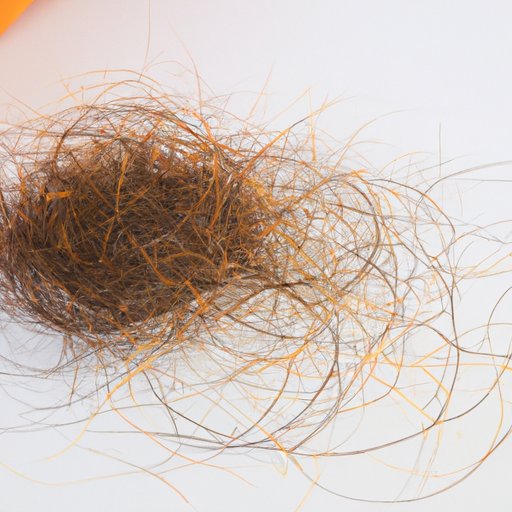Introduction
Hair loss is a common problem that affects both men and women. While it’s normal to experience some hair loss as you age, excessive hair shedding can be cause for concern. In this article, we’ll explore the various causes of hair loss, common treatments, and tips for preventing it.
Definition of Hair Loss
Hair loss, also known as alopecia or baldness, is the partial or complete absence of hair from areas where it usually grows. It can affect any part of the body, but is most commonly seen on the scalp. Hair loss can occur in both men and women, and can range from mild shedding to complete baldness.
Overview of Causes and Risk Factors
Hair loss can be caused by a variety of factors, including genetics, hormonal imbalances, medical conditions, medications, stress, and poor nutrition. Certain hairstyles and treatments, such as tight braids or chemical straightening, can also contribute to hair loss. In most cases, hair loss is temporary, but in some cases it can be permanent.

Common Treatments for Hair Loss
Treatment for hair loss will vary depending on the underlying cause. Common treatments include medications, surgery, and alternative therapies. Your doctor may recommend one or more of these treatments based on your individual needs.
Medications
Medications are often used to treat hair loss. The most common medications are minoxidil (Rogaine) and finasteride (Propecia). Minoxidil is applied topically to the scalp, while finasteride is taken orally. Both medications can stimulate hair growth, but they must be used consistently over time to see results.
Surgery
In some cases, surgery may be an option for treating hair loss. Hair transplant surgery is a procedure in which healthy hair follicles are taken from other parts of the body and transplanted to the affected area. This procedure can be effective in restoring hair, but it can be expensive and may not be covered by insurance.
Alternative Treatments
Many people turn to alternative treatments for hair loss, such as herbal supplements and essential oils. However, there is limited scientific evidence to support the effectiveness of these treatments. It’s important to talk to your doctor before trying any alternative treatments, as some may have side effects or interact with medications.

Tips for Preventing Hair Loss
Although there is no guaranteed way to prevent hair loss, there are steps you can take to reduce your risk. Here are some tips for preventing hair loss:
Avoid Stress
Stress can trigger hair loss, so it’s important to find ways to manage stress and relax. Taking time for yourself, getting enough sleep, and finding healthy outlets for stress, such as exercise and meditation, can help reduce stress levels and protect against hair loss.
Eat a Healthy Diet
Eating a balanced diet that includes plenty of fruits, vegetables, lean proteins, and whole grains can help promote hair growth. Avoid crash diets, which can lead to nutrient deficiencies and cause hair loss.
Avoid Certain Hair Care Products
Certain hair care products, such as dyes, bleaches, and styling products, can damage the hair and lead to hair loss. If you use these products, be sure to follow the instructions carefully and use only when necessary.
Exercise Regularly
Exercising regularly can help keep your body and mind healthy, which can in turn help prevent hair loss. Aim for at least 30 minutes of moderate exercise each day.
How to Manage Stress-Related Hair Loss
If you’re experiencing hair loss due to stress, there are steps you can take to manage the condition. First, identify the sources of stress in your life and try to minimize them. Then, develop stress management strategies, such as deep breathing, yoga, and mindfulness exercises.
The Link Between Diet and Hair Loss
Your diet can play an important role in promoting healthy hair growth. Nutrient deficiencies, eating disorders, and unhealthy diets can all contribute to hair loss. Eating a balanced diet that includes plenty of fruits, vegetables, lean proteins, and whole grains can help ensure your body gets the nutrients it needs for healthy hair.

Diagnosing and Treating Alopecia Areata
Alopecia areata is an autoimmune disorder that causes patchy hair loss. Symptoms of alopecia areata include round patches of baldness on the scalp, eyebrows, and beard. Diagnosis is typically made through a physical exam and blood tests. Treatment options include topical corticosteroid creams, intralesional steroid injections, and light therapy.
Conclusion
Hair loss is a common problem that can be caused by a variety of factors. Common treatments include medications, surgery, and alternative therapies. There are also steps you can take to prevent hair loss, such as avoiding stress, eating a healthy diet, and avoiding certain hair care products. If you’re experiencing hair loss, talk to your doctor about treatment options and potential causes.


